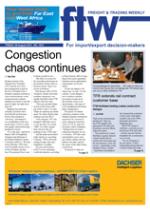‘Rail service inconsistency
hurting SA’. That was
the FTW headline that
galvanised TFR sales and
marketing executive Bheka
Xaba into action.
The assertion by United
Maritime Logistics director
Claude Nuttall that the
current slow movement and
the inconsistency of the rail
service – particularly on the
Durban-Jo’burg corridor
– had forced consolidators
into transporting containers
via the costly road option
touched a nerve for TFR’s
passionate and driven
marketing man.
With FTW acting as
facilitator, a meeting was set
up between TFR and UML
– and the outcome laid the
foundation for a constructive
way forward.
“For us, first prize is
the rail option,” UML’s
Johannesburg-based director
Corinne French told Xaba. “But because rail is
unreliable, and because
of customer pressure
to deliver to their Just
In Time requirements,
we’re forced to use road
transport and absorb the
additional costs.”
Clearly the will is
there, but the service isn’t
– in French’s view.
One of UML’s
containers was recently
delayed for 10 days in
Durban, French told
Xaba. “We don’t find
delays once it’s on the
train – but it’s before it
gets on rail where the
problems lie.”
Clearly the integration
between port and rail is
a major sticking point,
which Xaba says is being
addressed.
“We have started
offering customers
integrated service levels
that involve the port. We
even have a joint planning
set-up, with rail planners
sitting in the same office
as the port planners.
“If there’s a delay in
the vessel we can factor
that in. If there are delays
with trains, we pass the information onto ports. This
collaboration has assisted us
enormously.”
As soon as a container is
loaded on rail and released to
TFR, it moves, says Xaba.
“The first boxes offloaded
in Durban arrive in City Deep
in 24 hours. And once the
vessel is offloaded, the last
box is available in 60 hours.”
Problems generally arise
with customers who don’t
have a direct relationship
with TFR and work through
middlemen, he added.
“In the past we dealt
exclusively with intermodal
companies and shipping lines
but have recently expanded
our client base to offer
logistics companies the option
of dealing directly with us and
setting up a direct account.
“For direct customers TFR
communicates on a regular
basis – moving containers
based on a priority list and
providing daily reports on the
status of their boxes.”
MSC and Maersk are two
of the biggest TFR customers,
says Xaba.
“We engage them on
a regular basis and have
commitments in terms of
the time the box leaves the
vessel. We measure the last
box up till it’s available in
City Deep for collection –
with Maersk there was a
60-hour commitment which is
currently under negotiation,”
he said.
The results of TFR’s
customer-focused efforts, says
Xaba, have been exceptionally
positive.
“We’ve improved our
market share from 17% in
2007 to 34% at the end of the
last financial year.”
And while the rail utility
remains significantly underresourced
because of the
time lines between ordering
equipment and delivery, by
working smarter it has made
significant strides.
By running its longer
Anaconda trains – 75 wagons
instead of 50 – it has increased
capacity with existing limited
resources.
“And we are on track
in terms of our renewal
programme. We have started
receiving some of the diesels
and believe that with the
resources we have we are in
a position to offer customers
a reasonable if not superior
service.”
Xaba’s mission is to change
outdated perceptions and to
demonstrate TFR’s ‘can do’
approach.
UML was clearly impressed
– but the proof of the pudding
will be in the eating …
TFR extends rail contract customer base
26 Aug 2011 - by Joy Orlek
0 Comments
FTW - 26 Aug 11

26 Aug 2011
26 Aug 2011
26 Aug 2011
26 Aug 2011
26 Aug 2011
26 Aug 2011
26 Aug 2011
Border Beat
Featured Jobs
New
